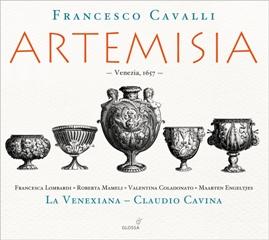Francesco Cavalli – Artemisia (2010)
Francesco Cavalli – Artemisia (2010)

01. Prologue 02. Act I 03. Act II 04. Act III Artemisia - Francesca Lombardi-Marzulli (soprano) Artemia - Sakiko Abe (soprano) Oronta - Valentina Coladonato (soprano) Meraspe - Maarten Engeltjes (countertenor) Alindo - Roberto Balconi (countertenor) Ramiro - Marina Bartoli (soprano) Eurillo - Silvia Frigato (soprano) Indamoro - Salvo Vitale (bass) La Venexiana Claudio Cavina – conductor
It's not necessary to make extravagant claims for Francesco Cavalli's originality to recognize his absolute mastery of the style of mid-17th century Venetian opera perfected by Monteverdi in L'incoronazione di Poppea. The fact that he was able to keep the operatic form so fresh and vital (and most importantly, hugely entertaining) for more than a generation after Monteverdi's death is achievement enough. The modern revivals of more and more unknown Cavalli operas continue to add luster to his legacy. Artemisia overflows with examples of the first-rate inventiveness of Cavalli's imagination; examples include the magical triple echoes of Eurillo's second-act "Regina, udiste mai"; the ravishing lyricism of the aria "Ardo, sospiro, e piango"; and the expressive intensity of his slithering Gesualdo-like harmonic digressions. Like Monteverdi (and all great opera composers), Cavalli had a consummate gift for using music to drive the drama forward, and Claudio Cavina knows how to exploit that gift; he and his ensemble La Venexiana make this obscure opera spring to startling life. His singers throw themselves into their roles with unguarded passion, and even though the details of the plots may be impenetrable, the characters' emotions are urgently immediate. All of the soloists are superb. Sopranos Francesca Lombardi Mazzulli, Sakiko Abe (replaced Roberta Mameli), Valentina Coladonato, and Silvia Frigato stand out; they are simply remarkable for the piercing purity and fullness of their voices, the extravagant agility of their coloratura, and the transparent honesty of their characterizations. The instrumental ensemble plays with wonderful fluidity and Cavina draws a maximum of timbral variety from his group of 12 bowed and plucked strings. The upper strings have a somewhat nasal quality that may require a period of adjustment for modern listeners. Like Cavina's exemplary 2010 recording of L'incoronazione di Poppea with La Venexiana, his world-premiere recording of Artemisia raises the bar very high for performances of Baroque opera, or any opera, for that matter. Glossa's sound is characteristically natural, absolutely clean, and warmly enveloping. Highly recommended. --- Stephen Eddins, Rovi
download: uploaded yandex 4shared mediafire solidfiles mega zalivalka filecloudio anonfiles oboom
